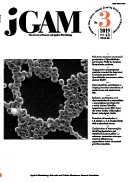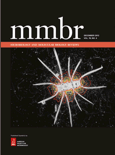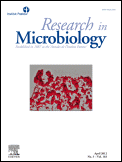
MOLECULAR MICROBIOLOGY
Scope & Guideline
Illuminating the Molecular World of Microbes
Introduction
Aims and Scopes
- Microbial Genetics and Molecular Mechanisms:
Research that explores the genetic basis of microbial functions, including gene regulation, mutation, and the molecular mechanisms underpinning microbial behavior. - Host-Microbe Interactions:
Studies investigating how microorganisms interact with their hosts, including pathogenic interactions, immune evasion, and symbiotic relationships. - Biofilm Formation and Structure:
Research addressing the formation, structure, and dynamics of biofilms, focusing on the molecular and environmental factors that influence biofilm development. - Antimicrobial Resistance:
Exploration of mechanisms of resistance in bacteria and fungi, including the genetic and biochemical bases of resistance to common antibiotics and antifungals. - Metabolic Pathways and Environmental Adaptation:
Studies examining how microbes adapt their metabolic pathways to fluctuating environmental conditions, including nutrient availability and stress responses. - Microbial Ecology and Community Dynamics:
Research focusing on the ecological interactions within microbial communities, their diversity, and their roles in various ecosystems. - Technological Advances in Microbiology:
Innovations in methods and technologies, such as CRISPR and high-throughput sequencing, that enhance our understanding of microbial biology.
Trending and Emerging
- Microbiome Research:
There is a growing emphasis on the study of microbiomes, particularly their roles in health, disease, and environmental interactions, highlighting the importance of microbial communities in various ecosystems. - CRISPR and Gene Editing Technologies:
Research utilizing CRISPR and other gene editing technologies is on the rise, focusing on their applications in microbial genetics, pathogenesis, and biotechnology. - Synthetic Microbiology and Engineering:
Emerging studies in synthetic biology that involve engineering microbial systems for specific functions, including bioremediation and biofuel production, are increasingly featured. - Host-Pathogen Interactions at the Molecular Level:
There is a trend towards detailed investigations of molecular interactions between pathogens and host cells, including the identification of effector proteins and signaling pathways. - Antimicrobial Resistance Mechanisms:
Research into the molecular mechanisms of antimicrobial resistance is expanding, particularly in relation to the development of new therapeutic strategies to combat resistant strains. - Environmental Microbiology and Climate Change:
Studies addressing the impact of climate change on microbial communities and their functions are gaining prominence, reflecting the growing importance of environmental issues in microbiology.
Declining or Waning
- Basic Microbial Physiology:
While foundational studies on microbial physiology remain important, there is a noticeable decline in publications focused solely on basic physiological processes without a link to broader ecological or health implications. - Traditional Pathogen Characterization:
Research that solely characterizes pathogens based on classical methods without integrating modern genomic or proteomic approaches is less frequently published, as newer methodologies become mainstream. - Single-Organism Studies:
There is a waning interest in studies focusing exclusively on single microbial species, as interdisciplinary and multi-species approaches gain traction in understanding complex interactions. - Conventional Antibiotic Testing:
Research centered on traditional methods of antibiotic susceptibility testing is declining in favor of studies that explore novel antimicrobial strategies or mechanisms of resistance. - Static Laboratory Models:
The reliance on static laboratory models for studying microbial behavior is decreasing, as there is a shift towards more dynamic and realistic models that better mimic natural environments.
Similar Journals

mSphere
Connecting researchers to the forefront of microbiological discovery.mSphere is a leading open-access journal published by the American Society for Microbiology, dedicated to the dynamic fields of Microbiology and Molecular Biology. Since its inception in 2016, mSphere has rapidly established itself as a reputable source of scholarly research, achieving notable impact factors and excellence within the academic community. The journal ranks in the top quartile (Q1) amongst its peers in Microbiology, and Q2 in the field of Molecular Biology, demonstrating its significance and relevance through Scopus rankings—specifically, it holds the #42 spot out of 182 in the Microbiology category and #108 out of 410 in Molecular Biology. With an editorial commitment to advancing the understanding of microbial and molecular sciences, mSphere provides an accessible platform for researchers, professionals, and students alike to disseminate groundbreaking findings. The journal promotes rigorous peer-review and invites innovative contributions aimed at enhancing microbial research mobility and molecular exploration. Accessible openly since 2016, mSphere continues to thrive as an influential publication driving scientific dialogue and discovery in the microbiological sciences.

ARCHIVES OF MICROBIOLOGY
Unveiling the Secrets of Microbial LifeThe Archives of Microbiology, published by Springer, is a reputable journal in the field of microbiology, serving as a vital platform for the dissemination of groundbreaking research and critical reviews since its inception in 1974. With an ISSN of 0302-8933 and an E-ISSN of 1432-072X, this journal operates out of Germany and maintains a global reach, promoting high-quality scholarship across multiple disciplines, including biochemistry, genetics, and molecular biology, as evidenced by its Q2 ranking in Medicine (miscellaneous) and consistent Q3 placements in other categories in 2023. Although the journal does not offer open access options, its rigorous peer-review process ensures that published articles are of the highest standard, making it an essential resource for researchers, professionals, and students keen on advancing their understanding of microbial sciences. As the journal converges toward 2024, it remains committed to fostering innovative microbiological research and facilitating interdisciplinary dialogue within the scientific community.

JOURNAL OF GENERAL AND APPLIED MICROBIOLOGY
Unveiling the microscopic world for practical solutions.JOURNAL OF GENERAL AND APPLIED MICROBIOLOGY, published by the MICROBIOL RES FOUNDATION, is a vital resource in the fields of applied microbiology and biotechnology, as well as in diverse medical applications, serving an academic community dedicated to advancing microbial science. Established in 1955, this journal has a rich history of disseminating innovative research and insights into the intricate world of microorganisms. With an ISSN of 0022-1260 and an E-ISSN of 1349-8037, the journal maintains high scholarly standards and robustness, reflected in its 2023 Scopus rankings placing it in the Q3 and Q4 quartiles within its categories. While primarily based in Japan, the journal engages a global audience, offering valuable contributions that inform both theoretical perspectives and practical applications in microbiology. Despite being a non-open-access publication, it provides pivotal research findings essential for academics, professionals, and students alike, fostering a deeper understanding of microbial impact on health and the environment.

MICROBIOLOGY AND MOLECULAR BIOLOGY REVIEWS
Unraveling Complexities in Microbiology and Molecular BiologyMICROBIOLOGY AND MOLECULAR BIOLOGY REVIEWS, published by the American Society for Microbiology, is a premier journal dedicated to advancing the fields of microbiology and molecular biology. With an impressive impact factor reflective of its Q1 ranking in categories such as Immunology, Infectious Diseases, and Molecular Biology, this journal consistently showcases high-quality, peer-reviewed articles that contribute to the current understanding of microbial life and molecular mechanisms. Operating since 1997, the journal aims to bridge the gap between microbiological methods and molecular biology applications, making it an essential resource for researchers, professionals, and students alike. Readers can access content through various platforms, ensuring that the latest findings are readily available to the scientific community. With its esteemed reputation, MICROBIOLOGY AND MOLECULAR BIOLOGY REVIEWS remains a leading voice in the exploration of the life sciences, catering to a broad audience deeply invested in unraveling the complexities of microbial and molecular systems.

Cell Host & Microbe
Connecting Microbiology with Health and DiseaseCell Host & Microbe is a premier journal published by CELL PRESS, dedicated to advancing the field of host-microbe interactions and infectious diseases. With an impact factor reflecting its esteemed position among scholarly publications, this journal not only focuses on the intricacies of microbiology but also delves into critical areas such as Cancer Research, Immunology, and Molecular Biology, maintaining a distinguished Q1 ranking across several categories. Since its inception in 2007, Cell Host & Microbe has been at the forefront of disseminating high-quality research, providing invaluable insights for researchers, professionals, and students alike. The journal is committed to promoting understanding of the complex relationships between microbial entities and their hosts, filtering groundbreaking research from the top echelons. Located in the heart of Cambridge, MA, USA, this journal serves as an essential resource for anyone looking to deepen their knowledge in microbiology and its applications in health and disease.

RESEARCH IN MICROBIOLOGY
Illuminating the complexities of life at the microscopic level.Research in Microbiology, published by Elsevier, is a prominent academic journal devoted to advancing the field of microbiology, encompassing a diverse array of topics including immunology, molecular biology, and biochemistry. Established in 1987, the journal has expanded its focus over the years, with a commendable impact factor reflecting its relevance and influence in the scientific community. Although it does not currently offer open access options, Research in Microbiology remains a crucial resource for researchers and professionals seeking to stay abreast of the latest findings and methodologies. The journal holds a respectable Q2 ranking in Medicine (miscellaneous) and a Q3 ranking in both Microbiology and Molecular Biology for 2023, highlighting its position within the scholarly landscape. With its base in France and accessible to a global audience, Research in Microbiology continues to foster scholarly exchange, making it an essential platform for the dissemination of impactful microbiological research.

CANADIAN JOURNAL OF MICROBIOLOGY
Pioneering Discoveries in Applied MicrobiologyThe Canadian Journal of Microbiology, published by Canadian Science Publishing, is a well-respected journal established in 1954 that serves as a vital platform for advancing knowledge in the fields of microbiology and related disciplines. With an ISSN of 0008-4166 and an E-ISSN of 1480-3275, this journal is recognized for its rigorous peer-review process and its commitment to disseminating high-quality research that spans applied microbiology, biotechnology, genetics, immunology, and more. Currently indexed in several prestigious databases, its impact factor and category quartiles highlight its significance, ranking in the top tiers of applied microbiology and biotechnology as well as other intersecting fields. The journal provides an essential resource for researchers, professionals, and students seeking to stay informed on the latest advancements and breakthroughs, facilitating collaboration and innovation in the microbiological sciences. Set in the dynamic landscape of academia from its headquarters in Ottawa, Canada, the Canadian Journal of Microbiology remains steadfast in its mission to promote research that addresses key challenges and opportunities within the microbiological community.

ANTONIE VAN LEEUWENHOEK INTERNATIONAL JOURNAL OF GENERAL AND MOLECULAR MICROBIOLOGY
Driving Progress in General and Molecular MicrobiologyANTONIE VAN LEEUWENHOEK INTERNATIONAL JOURNAL OF GENERAL AND MOLECULAR MICROBIOLOGY, published by Springer, is a vital resource for advancing research in the fields of microbiology and molecular biology. With its ISSN 0003-6072 and E-ISSN 1572-9699, this journal consistently focuses on cutting-edge studies and developments, providing a platform for the dissemination of knowledge that spans over its rich history from 1934 onwards. The journal holds an impressive reputation, ranked Q2 in Medicine (miscellaneous) and Q3 in both Microbiology and Molecular Biology for 2023, reflecting its significant contribution to the scientific community. Researchers and professionals from various disciplines rely on this journal for quality publications that address complex microbial interactions and molecular mechanisms. Although it currently does not provide open access options, its compelling research remains accessible through institutional subscriptions, allowing it to foster collaborative advancements in the ever-evolving landscape of microbiological sciences.

Molecular Genetics Microbiology and Virology
Pioneering Research in Molecular Genetics and MicrobiologyMolecular Genetics Microbiology and Virology is an esteemed academic journal published by PLEIADES PUBLISHING INC, specializing in the complex interplay of genetics, microbiology, and virology. Established in 2007, this journal serves as a crucial platform for researchers and professionals committed to advancing our understanding of infectious diseases and molecular biology. Despite its current categorization in Q4 across several fields, the journal aims to evolve and foster significant discourse within the scientific community. While not an open access journal, it provides essential insights and high-quality research articles that contribute to the body of knowledge in molecular genetics and related disciplines. Located in the vibrant research landscape of New York, USA, the journal also encourages new submissions that address cutting-edge research topics and emerging trends in infectious diseases, thereby appealing to both emerging scholars and seasoned experts alike.

MICROBIOLOGY
Exploring Innovations in Applied MicrobiologyMICROBIOLOGY (ISSN: 0026-2617, E-ISSN: 1608-3237), published by MAIK NAUKA/INTERPERIODICA/SPRINGER, is a pivotal journal in the field of microbiological research, operating from the vibrant hub of New York, United States. With a focus on the intricate relationships and functionalities of microorganisms, MICROBIOLOGY serves as an essential resource for professionals and researchers dedicated to advancing the knowledge of applied microbiology and biotechnology. As of 2023, it holds a competitive Q3 and Q4 category ranking in Applied Microbiology and Biotechnology and Microbiology, respectively, reflecting its commitment to high-quality and impactful research. Although currently not open access, the journal extends comprehensive insights into critical topics that span environmental microbiology, clinical applications, and biotechnology advancements, making it a vital platform for disseminating innovative findings in this ever-evolving discipline. Researchers and students alike will find MICROBIOLOGY to be an invaluable addition to their academic and professional repertoire.